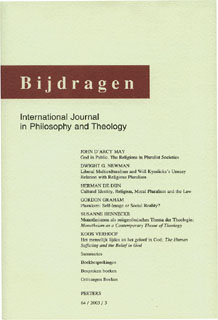 previous article in this issue previous article in this issue | next article in this issue  |

|
Document Details : Title: No sense of history beyond the history we sense Subtitle: Church history between philosophy and theology of history Author(s): SALEMINK, Theo Journal: Bijdragen Volume: 61 Issue: 4 Date: 2000 Pages: 437-458 DOI: 10.2143/BIJ.61.4.565625 Abstract : A question that occupies centre stage in what the Germans call ‘Zeitgeschichte’ – the historiography of our own time, i.e. the nineteenth and especially the twentieth century, reads: How much inner coherence can still be discerned in this modern age with its unprecedented change and devastation? Is there any significant meaning for humanity to be ‘discovered’ in the near infinite number of events that fill this period? Does religion and God still make sense? In this essay, which is an attempt to reflect on the twentieth century at the point where philosophy, theology and (church) history meet, and in conversation with the Italian philosopher Vattimo, Salemink pursues this question in a number of steps. The first step is an analysis of the four clusters of metaphors concerning the coherence of the modern era: preservation, decline, progress, and revolution and of their crisis at the end of the twentieth century. The second step is a short description of Vattimo’s position and of the critic on Vattimo by Jonkers in his article. Salemink: “Although at first I had many reservations, especially about his ‘romantic leap’ towards such things as kenosis and caritas, after subsequent reflection, as is clear from this article, I have been increasingly taken by his attempt. In fact, I have undertaken a defence of Vattimo against the kind of critique which, while critical of Vattimo, regards a transcendent limit to modernity as either desirable or possible. I sought to historicise Vattimo.” Perhaps a foundation is to be found for the ‘limit of love’ (the caritas criterion), which does not secretly invoke transcendence. Such an anchoring could be obtained via the phenomenon of ‘tradition’, with the meaning of a ‘historical library’. Salemink: “I have in fact linked him with older movements within Western theology itself that have reflected on a ‘religionless Christianity’ – with the philosophy and theology of history of dialectical theologians like Bonhoeffer, Barth and Miskotte, but especially with Arend Th. Van Leeuwen, and via his mediation with Karl Marx, the anonymous theologian of the nineteenth century. The solution offered by both Van Leeuwen and Vattimo is debatable, but not the challenge – not even for those who advance good arguments for the view that a transcendent God offers a better foundation for a critical limit to the modern delusion of omnipotence.” |
